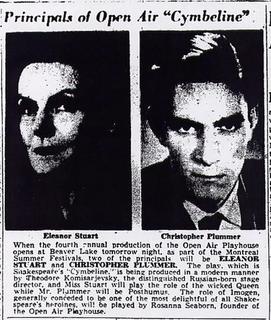 I have just seen the final night of the Open Air Theatre Regent's Park performance of Shakespeare's Cymbeline, which was very good, and made more delightful by the surroundings, complete with summer Christmas lights in the rustling trees. The only distractions were random planes and preposterusly inappropriate fireworks in the third act, but that is half the fun of such stages - they are vunerable to the world.
I have just seen the final night of the Open Air Theatre Regent's Park performance of Shakespeare's Cymbeline, which was very good, and made more delightful by the surroundings, complete with summer Christmas lights in the rustling trees. The only distractions were random planes and preposterusly inappropriate fireworks in the third act, but that is half the fun of such stages - they are vunerable to the world.The play itself, often thought to be complex to the point of (willful?) absurdity, under the nuanced direction of Rachel Kavanaugh, revealed itself to be a profound unveiling of layers of reconciliation - all things pardoned.
The young, good cast yielded several star turns, among them a lithe, swarthy, over-determinedly strutting Malkovichian Iachimo, played by Simon Day, and an exuberant, under-sized and comical Cloten, from James Loye.
The play, seen by some as a footnote, strikes me as one of the greatest from the master - and, as one of his last - a profound redressing of tragedy itself as a genre. The key terrors of the play - murder of a wife by a jealous husband (Othello); poison of a king (Hamlet); sleep misread as death (Romeo and Juliet); a weak king who disowns those he should trsut (Lear); Roman violence (Julius Caesar) - I could go on - are resolved and dissolved in the denoument, which seems to sweep aside both fiction and fact to achieve an unparalleled vision of grace.
I found this clipping showing that Cymbeline (not seen in the Open Air of Regent's Park for 50 years until this season) was played in such an environment in my home of Montreal, 55 years ago, by the Canadian thespian, Christopher Plummer, as a much younger man.
Comments